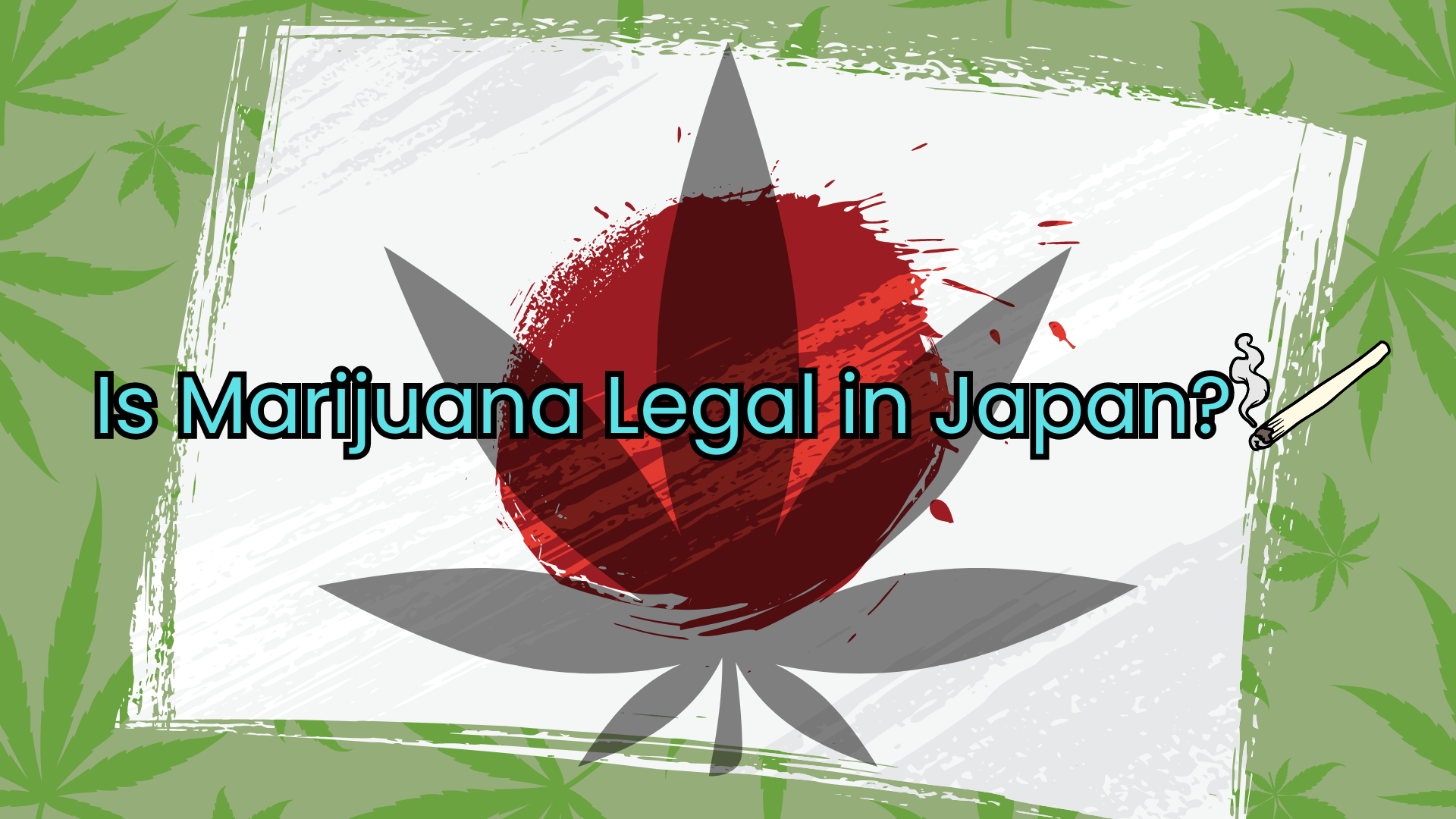Is weed legal in Japan?
How does Japan’s approach to marijuana differ, and what do you need to know to stay out of trouble?
We delve into Japan’s laws and regulations around cannabis to discover the limitations on its use, possession, and sale.
Whether you're planning a trip to Japan or simply curious about its drug laws, it's crucial to understand these rules to stay on the right side of the law.
And one more thing—don't forget to pack an iRoamly Japan travel eSIM. It's a reliable way to stay connected and access important information during your trip!

Is Marijuana Legal in Japan?
No. Cannabis is illegal in Japan.
Under Japan’s newly updated Cannabis Control Law and Narcotics and Psychotropic Substances Control Law, it is illegal to use, possess, grow, sale, purchase, or import/export marijuana plants or any products derived from them.
Is Cannabinoid Legal in Japan?
CBD and other cannabinoids are legal in Japan, providing they contain absolutely no THC – this is the legal definition that separates cannabinoids from illegal marijuana.
They are widely available in forms such as oils, creams and food supplements, and are used for health benefits without any psychoactive properties.
Medical and Industrial Hemp in Japan
1. Are They Legal?
Yes, but with significant restrictions.
There's a whole bunch of conditions and exceptions involved.
Basically, the industrial side of cannabis, such as hemp seeds and the mature stalk, are legal for industrial use in products like animal feed and essential oils, textiles, or objects used in traditional Shinto religious practices. But just about everything else is illegal, from recreational use to even uncertified medical use.

2. Strict Regulation on Cultivation Licenses
The Japanese government is very cautious about issuing licenses for cultivating cannabis.
As of the close of 2022, a mere 27 licenses to cultivate the plant had ever been issued in the country. This tight control makes the market for cannabis plants and their products almost non-existent, as only licensed researchers or cultivators can legally grow them.
Under the newly amended Cannabis Plant Cultivation Regulation Act (expected to be enforced in 2025), a person must first apply for a cannabis plant grower license, either Class I or Class II, depending on the cultivation purpose, if they wish to grow cannabis plants:
Class I Cannabis Cultivator License:
A Class I cannabis grower is a person who cultivates cannabis plants to collect the raw materials, including mature stalks, seeds, or any other product (e.g. CBD products) allowed.
They can grow cannabis plants containing only THC, as long as the THC content does not exceed 0.3% of the plant by weight.
Those growing Class I marijuana need a license from the governor, which they will have to renew every three years.
Licensed Class I cannabis cultivators are permitted to extract CBD from the cannabis plants they grow with an additional license from the Minister of Health, Labour and Welfare.
Class II Cannabis Cultivator License:
Class II medical marijuana growers cultivate plants for the raw ingredients in pharmaceutical applications.
They are permitted to cultivate cannabis plants with high concentrations of THC.
Class II licenses to cultivate cannabis are issued by the Minister of Health, Labour and Welfare and are required to be renewed every year.
3. Law Change for Medical Cannabis and Cannabinoids
Changes in the law have eased controls on medicinal products made from cannabis.
Such products are now available if they are recognised by the Pharmaceutical and Medical Devices Act – even if they contain cannabis.
Any pharmaceutical product containing THC, however, will continue to be classified as strictly controlled narcotics, requiring a manufacturing and distribution licence in addition. This means that use cannabis directly for medical purposes, outside approved pharmaceutical products, remains illegal.
Japanese Cannabis Laws and Penalties
In Japan, they take cannabis very seriously. The Cannabis Control Law, which came into force in 1948, has been amended several times since, with the revisions invariably serving to toughen penalties and restrictions.
What are the penalties for cannabis offenses in Japan?
From December 12th 2024, Japan’s cannabis laws will become much harsher:
The Ministry of Health proposes that anyone using, possessing or growing cannabis could face seven years in prison.
A maximum sentence of up to seven years is proposed for cannabis possession, as well as for its transfer or receipt, as well as a fine of up to 2 million JPY.
Growing, exporting or importing it, meanwhile, deserves ten years and a fine of up to 3 million JPY.
Japan had previously been relatively permissive about use, in order to protect domestic hemp farmers. The government now, however, wants to make sure that more people, especially young people, do not use it.

What should travelers know?
If you’re visiting Japan, these laws apply to you just as much as they do to locals. The country can be just as strict with tourists as with its citizens when it comes to drugs. So being caught with weed saying you weren’t aware of the rules is not going to help you avoid tough punishment.
This could mean time in jail or deportation. And, no, there is no special treatment for tourists—you are expected to obey the law. Understanding local laws in Japan is as important as caring about tourist safety issues in Japan to ensure a smooth and trouble-free trip.
How does Japan's approach to cannabis regulation compare to global trends?
While much of the world is relaxing its rules on cannabis, Japan is bucking the trend and staying tough. Cannabis use is low in Japan, both compared to other countries and to other drugs, only 1.8% of the population tried it in 2019, according to Wikipedia.
Customs Checks for Travelers
If you plan to travel to Japan, remember that customs checks are stringent. Any cannabinoids or cannabis-based products that contain THC are governed by strict laws, and attempting to import them may lead to criminal charges, fines or deportation.
Japan's list of prohibitive items for entry is extensive, so it is best to familiarize yourself before travel to avoid any inadvertent mistakes and to ensure a smooth trip.
To see what you can’t bring into Japan, visit: https://www.customs.go.jp/english/summary/passenger.htm
Japanese Attitude Towards Marijuana
There is a strong cultural stigma against marijuana use in Japan, and both the law and public sentiment portrays it as damaging to social fabric and individual stability. Morever, high-profile scandals involving public figures have increased mainstream awareness and discussions.

Paul McCartney's 1980 arrest at Narita International Airport and the ousting of four sumo wrestlers from the sport in 2008 over marijuana-related charges have significantly shaped contemporary discussions around its use, drawing attention to how Japanese sports have been impacted by such controversies.
FAQ
1. Are vapes illegal in Japan?
Vaping devices themselves are not illegal, but using cartridges containing THC is. Nicotine-based liquids are regulated but allowed.
2. Is CBD legal in Japan?
Only if it has absolutely no THC in it, and even then, its sale is tightly restricted.
3. Do they drug test tourists in Japan?
While tourists aren’t commonly targeted for drug testing, accusations of other illegal behavior or drug use may raise suspicions.
Summary
Knowing the law about cannabis in Japan is important for visitors and residents alike. With strict laws and little social leeway for drug use, avoiding a brush with the law can be as simple as staying informed.
That way, you can enjoy your time in the country without fear of unintended legal consequences.
